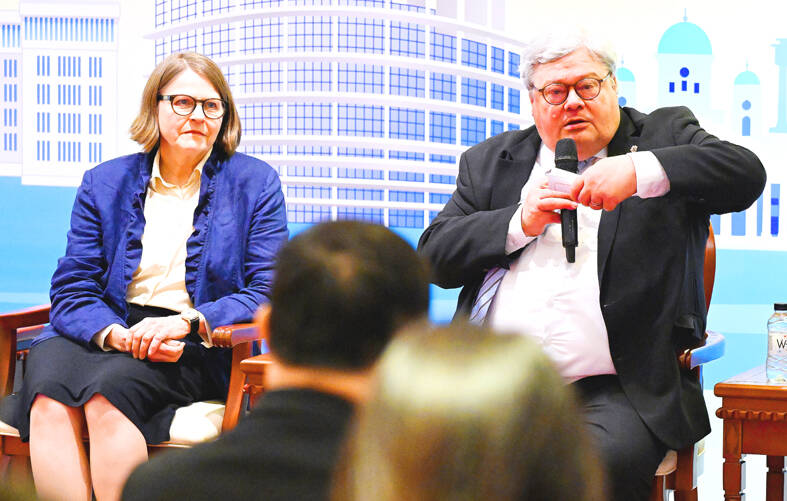Peace and stability in the Taiwan Strait is vital for the growth of the global economy, the leader of a delegation of Members of the European Parliament said yesterday, while calling Taiwan a trusted partner for enhanced cooperation with European countries in areas such as semiconductors.
With the many new friends Taipei has made in Europe, thanks to President Tsai Ing-wen’s (蔡英文) efforts in the past few years, Taiwan would receive mutual support and assistance as a member of “Team Democracy,” delegation leader and German member of the European Parliament Reinhard Butikofer told a news conference at the Ministry of Foreign Affairs in Taipei.
Asked if Europe should abandon its long-held reluctance to provide Taiwan with arms amid escalating cross-strait tensions, Butikofer, chairman of the European Parliament Delegation for Relations with the People’s Republic of China, likened European democracies to “turtles.”

Photo: Liao Chen-huei, Taipei Times
“They don’t move very fast. They don’t change the direction suddenly, but once they get moving, they’re not easily stopped,” he said.
With the Russian invasion of Ukraine, “Europe has changed. My own country has changed” its policies on arms exports, he added.
However, Butikofer also said that he is not sure what Taiwan needs defensively, although he has heard a lot of discussions of asymmetrical warfare during his Taiwan visit, and is not sure if the fighters and tanks Germany produces would be “exactly what Taiwan needs” for its defense.
Other delegation members include European Parliament Vice President Heidi Hautala, German Bundestag members Agnieszka Brugger and Boris Mijatovic, as well as German-Taiwan Parliamentary Friendship Group deputy chair Till Steffen, all of whom are members of green parties in their nations.
On Tuesday, during a visit to the Democratic Progressive Party (DPP) headquarters, Butikofer said the world has underestimated the threat posed by China and Russia.
If Russia’s effect on the world is like a typhoon, then China’s would be like climate change, he said.
Supporting Taiwan’s democracy, and preserving regional peace and stability in the Taiwan Strait are the values of the EU, and the delegation looks forward to collaborating with Taiwan in many fields, not just in semiconductors and technology, he said, calling Taiwan a trusted friend and trading partner of Europe.
Minister of Foreign Affairs Joseph Wu (吳釗燮), speaking at a dinner for the delegation on Tuesday night, thanked the European Parliament and the German Bundestag for showing support for Taiwan and its participation in international organizations amid rising tensions in the Strait in the past few years.
Wu called for more collaboration with Germany and European countries to promote further interactions and enhance relations.
Vice president-elect Hsiao Bi-khim (蕭美琴), also speaking at the reception, said that the delegation’s visit would help EU lawmakers better understand that Taiwan has similar values to European nations, particularly in regards to democracy, freedom, the rule of law and human rights.
That has been the basis for the European Parliament and many countries supporting Taiwan, Hsiao said.

INVESTIGATION: The case is the latest instance of a DPP figure being implicated in an espionage network accused of allegedly leaking information to Chinese intelligence Democratic Progressive Party (DPP) member Ho Jen-chieh (何仁傑) was detained and held incommunicado yesterday on suspicion of spying for China during his tenure as assistant to then-minister of foreign affairs Joseph Wu (吳釗燮). The Taipei District Prosecutors’ Office said Ho was implicated during its investigation into alleged spying activities by former Presidential Office consultant Wu Shang-yu (吳尚雨). Prosecutors said there is reason to believe Ho breached the National Security Act (國家安全法) by leaking classified Ministry of Foreign Affairs information to Chinese intelligence. Following interrogation, prosecutors petitioned the Taipei District Court to detain Ho, citing concerns over potential collusion or tampering of evidence. The

‘FORM OF PROTEST’: The German Institute Taipei said it was ‘shocked’ to see Nazi symbolism used in connection with political aims as it condemned the incident Sung Chien-liang (宋建樑), who led efforts to recall Democratic Progressive Party (DPP) Legislator Lee Kun-cheng (李坤城), was released on bail of NT$80,000 yesterday amid an outcry over a Nazi armband he wore to questioning the night before. Sung arrived at the New Taipei City District Prosecutors’ Office for questioning in a recall petition forgery case on Tuesday night wearing a red armband bearing a swastika, carrying a copy of Adolf Hitler’s Mein Kampf and giving a Nazi salute. Sung left the building at 1:15am without the armband and apparently covering the book with a coat. This is a serious international scandal and Chinese

Seventy percent of middle and elementary schools now conduct English classes entirely in English, the Ministry of Education said, as it encourages schools nationwide to adopt this practice Minister of Education (MOE) Cheng Ying-yao (鄭英耀) is scheduled to present a report on the government’s bilingual education policy to the Legislative Yuan’s Education and Culture Committee today. The report would outline strategies aimed at expanding access to education, reducing regional disparities and improving talent cultivation. Implementation of bilingual education policies has varied across local governments, occasionally drawing public criticism. For example, some schools have required teachers of non-English subjects to pass English proficiency

TRADE: The premier pledged safeguards on ‘Made in Taiwan’ labeling, anti-dumping measures and stricter export controls to strengthen its position in trade talks Products labeled “made in Taiwan” must be genuinely made in Taiwan, Premier Cho Jung-tai (卓榮泰) said yesterday, vowing to enforce strict safeguards against “origin laundering” and initiate anti-dumping investigations to prevent China dumping its products in Taiwan. Cho made the remarks in a discussion session with representatives from industries in Kaohsiung. In response to the US government’s recent announcement of “reciprocal” tariffs on its trading partners, President William Lai (賴清德) and Cho last week began a series of consultations with industry leaders nationwide to gather feedback and address concerns. Taiwanese and US officials held a videoconference on Friday evening to discuss the